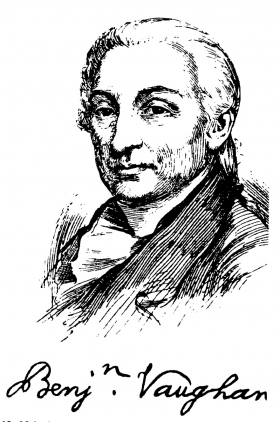(1751-1835) was born in Jamaica, West Indies on April 19, 1751. He was the oldest son of Samuel Vaughan, of London, a West India merchant and planter. His mother was Sarah Hallowell, daughter of Benjamin Hallowell, a Boston merchant.
Since his family were Unitarians, not belonging to the Church of England, Vaughan could not attend the elite “public schools.” He did attend Newcome School in Hackney near London and, at fourteen, was enrolled in Lincoln’s Inn, one of the fine “colleges in a university of law.” Shortly thereafter, a school for “Dissenters” as the Unitarians, Quakers and other were called, opened near Liverpool. He enrolled there and had the good fortune to be tutored by the famous scientist Joseph Priestly, who later discovered oxygen. Vaughan later studied medicine at Edinburgh, graduating in 1781.
After marrying Sarah Manning, he became a partner in her father’s firm. Through his family and scientific pursuits, he became lifelong friends with Benjamin Franklin, a fellow Unitarian. His relations with Franklin and his friendship with Lord Shelburne involved him informally in the negotiations for peace between England and the United States in 1782 during the American Revolution.
Having gone to Paris, Vaughan became acquainted with John Jay, and later John Adams, when they arrived there to conduct peace negotiations. Communications between Franklin, Jay and Adams in Paris, and Shelburne in England, passed through Vaughan for over seven months.
Although he served in the British parliament, he was too sympathetic to the republican ideas of the French Revolution of 1789 for powerful politicians. In 1794 we moved to France and then to Switzerland, but he had become so interested in republican principles that he determined to live in the United States.
He moved first to Boston, then in 1799 to Maine, and settled on lands on Kennebec river inherited from his mother, Sarah Hallowell, in what is now the town of Hallowell. Here he spent the remainder of his life, improving his estate, advocating conservative politics, working in his library, writing literary and political articles, and carrying on an extensive correspondence. When he came to Hallowell, his library was almost the size of Harvard college library at that time. He received the honorary degree of LL. D. from Harvard in 1807, and from Bowdoin in 1812.
For the first time, he practiced his medical profession, visiting only among the poor, and usually supplying medicines as well as advice without charge. He had charge of large tracts of land owned by his father and by his maternal grandfather, Benjamin Hallowell, and devoted himself to encouraging the settlement of the Kennebec region. In Hallowell he built houses, mills, stores, a distillery, a brewery, and a printing-office, and established a seaport at Jones’s Eddy, near the mouth of the Kennebec. He was active in agricultural pursuits and as agent for large non-resident landowners in various parts of Maine.
Beside the articles written in England on political and scientific subjects, he published political articles anonymously, and prepared a historical paper concerning the northeast boundary of the United States at President John Adams’s request.
In a charming passage, John Sheppard in 1865 wrote
. . . his library was choice and large; and his mansion was a spacious two-story house on a lofty hill, with a large piazza in front, overlooking a wide range of woods and waters. In the midst of such enchanting scenery, the first object which would attract his view on a summer morn as he stood by his chamber window, would be the Kennebec gliding along the pretty village, or reflecting in the distance hills and farms and primeval forests; . . . . [p. 10]
Benjamin Vaughan died in Hallowell on December 8, 1835.
Additional resources
Appleton’s Cyclopædia of America Biography. New York. D. Appleton and Company. 1887-1889. Vol. 6, pp 266-268.
Marvin, Mary Vaughan. Benjamin Vaughan 1751-1835. Hallowell. Hallowell Printing Co. 1979.
Murray, Craig C. Benjamin Vaughan (1751-1835): the Life of an Anglo-American Intellectual. New York: Arno Press. 1982.
Rowell, George S. “Benjamin Vaughan – Patriot, Scholar, Diplomat.” 1916. (from The Magazine of History, March, 1916)
Sheppard, John Hannibal. Reminiscences of the Vaughan Family, and More Particularly of Benjamin Vaughan, LL.D. Boston. D. Clapp & Son, Printers. 1865.


